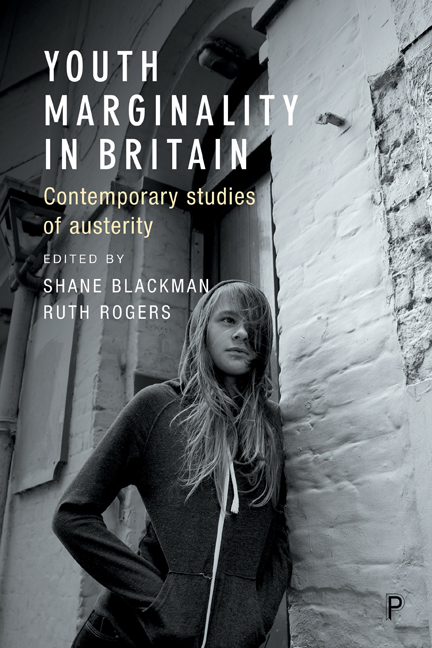one - Critically theorising young adult marginality: historical and contemporary perspectives
Published online by Cambridge University Press: 05 April 2022
Summary
Introduction: ‘austerity isn't over’
This introductory chapter will contextualise some of the key theoretical developments relating to young people's experiences of social marginalisation in Britain. First, we examine the disparity between populist labels used by government and media to describe young people who experience marginality in the UK. Second, we develop a theory of advanced youth marginality through the work of Loic Wacquant and John Westergaard. Third, we argue that there is a commonality of argument between Thomas Malthus and Charles Murray that defines the young adult poor through the use of biological metaphors such as a ‘redundant population’. Finally, we seek to advance the debate into new areas, by considering the political relationship between youth marginality and anomie. We maintain that young adults in Britain are subject to forms of biopolitical control by governmental and media organisations.
Popular images and punitive sanctions: young adults in Britain
The British tabloid media thrives on images of youth misrepresentation, showing marginalised young adults in dangerous spaces living on edgeof-town housing estates, in urban tower blocks or under rural isolation. Youth tend to be visually projected as either hooded and threatening, or wearing skimpy outfits suggesting low sexual morality (Blackman et al, 2015, p52). Young people's social exile is delivered through stereotypical caricatures enhanced by a narcissistic vision of young people addicted to mobile devices. These confining portrayals fail to capture the agency that young people use when they engage in social space, to gather and create bonds, to establish cultural memory and to affirm social relationships. Lisa Mckenzie (2015, p195) identifies that ‘stigma and stereotypes’ dominate how the young adult poor are represented and also denied self-conscious reflection of their situation. For young people, being in the park or on the street corner is a space of everyday action, where the hub of ‘doing nothing’ becomes active (Corrigan, 1976).
Across Britain, diverse sources suggest that young people face poverty and lack of opportunity. Watts (2014), writing for the Joseph Rowntree Foundation, states: ‘Benefits sanctions are adding to bleak prospects for young people’. Natalie Gil (17 November 2014) in The Guardian states: ‘Robbed of their futures … austerity cuts hit young people hardest’.
- Type
- Chapter
- Information
- Youth Marginality in BritainContemporary Studies of Austerity, pp. 3 - 22Publisher: Bristol University PressPrint publication year: 2017



